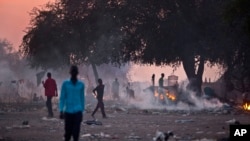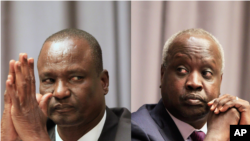At least 31,000 South Sudanese have fled to neighboring countries to escape deadly clashes that erupted in the world's newest nation more than three weeks ago, the United Nations' refugee agency (UNHCR) said Tuesday.
The bulk of the refugees have gone to Uganda and continue to cross into the country at the rate of 2,500 a day, UNHCR spokeswoman Melissa Fleming told reporters.
"As of Monday, 23,546 South Sudanese refugees had arrived in Uganda," she said.
The arrivals from South Sudan come on top of thousands of refugees who are fleeing to Uganda from the Democratic Republic of Congo.
"UNHCR and our partners are struggling to provide enough water and adequate sanitation at transit centres and at reception centres in the Arua and Adjumani districts of the West Nile region, in northwestern Uganda," Fleming said.
Smaller numbers of South Sudanese refugees have fled to other neighbouring countries including Ethiopia, where more than 5,300 refugees from South Sudan have been registered and Kenya, where 300 South Sudanese arrive daily at Kakuma refugee camp.
Sudan has also taken in several hundred, "and perhaps several thousand" refugees from South Sudan, Fleming said.
The UNHCR is providing services to some 230,000 refugees at 10 refugee camps insdie South Sudan, and the U.N. Mission in the country (UNMISS) is providing protection for some 62,000 people who have sought refuge at U.N. compounds.
Nearly half of the internally displaced persons are sheltering at two U.N. facilities in Juba, where fighting first erupted on Dec. 15 and where U.N. spokesman Farhan Haq said the situation remains tense.
UNMISS "also reports continued instability and fighting in a number of locations, including around Bor and in areas in Unity State," Haq told reporters at U.N. headquarters in New York.
"In Jonglei State, the Mission reports fighting south of Bor and sporadic gunfire in the vicinity of its compound. It also says that a number of explosions have been heard this morning, southeast of the city," Haq said.
An UNMISS patrol in Unity State reported that "most villages along the road from Mayom Junction to Pariyang appeared burnt or looted," Haq said, adding that local officials have reported "severe food, water and shelter shortages" to UNMISS.
Fighting broke out in the South Sudanese capital, Juba, on Dec. 15 when renegade soldiers attacked an army headquarters building.
President Salva Kiir said the violence in Juba was a failed coup bid by former Vice President Riek Machar, but Machar has consistently denied the charges.
The United Nations has said at least 1,000 people have died in the fighting, which has gone on for more than three weeks.
The two sides sent delegations to peace talks in Addis Ababa late last week.
After holding preliminary negotiations over the weekend with mediators, the warring factions on Tuesday began what chief mediator, Ethiopian diplomat Seyoum Mesfin, called "substantive" talks on a ceasefire and the status of 11 senior political leaders who were detained by the government in the days after the unrest began.
It was unclear if the delegates to the talks made progress toward resolving either issue and restoring peace in South Sudan.
The bulk of the refugees have gone to Uganda and continue to cross into the country at the rate of 2,500 a day, UNHCR spokeswoman Melissa Fleming told reporters.
"As of Monday, 23,546 South Sudanese refugees had arrived in Uganda," she said.
The arrivals from South Sudan come on top of thousands of refugees who are fleeing to Uganda from the Democratic Republic of Congo.
"UNHCR and our partners are struggling to provide enough water and adequate sanitation at transit centres and at reception centres in the Arua and Adjumani districts of the West Nile region, in northwestern Uganda," Fleming said.
Smaller numbers of South Sudanese refugees have fled to other neighbouring countries including Ethiopia, where more than 5,300 refugees from South Sudan have been registered and Kenya, where 300 South Sudanese arrive daily at Kakuma refugee camp.
Sudan has also taken in several hundred, "and perhaps several thousand" refugees from South Sudan, Fleming said.
Hundreds of thousands displaced inside South Sudan
The UNHCR is providing services to some 230,000 refugees at 10 refugee camps insdie South Sudan, and the U.N. Mission in the country (UNMISS) is providing protection for some 62,000 people who have sought refuge at U.N. compounds.
Nearly half of the internally displaced persons are sheltering at two U.N. facilities in Juba, where fighting first erupted on Dec. 15 and where U.N. spokesman Farhan Haq said the situation remains tense.
UNMISS "also reports continued instability and fighting in a number of locations, including around Bor and in areas in Unity State," Haq told reporters at U.N. headquarters in New York.
Fighting, gunfire, explosions near Bor
"In Jonglei State, the Mission reports fighting south of Bor and sporadic gunfire in the vicinity of its compound. It also says that a number of explosions have been heard this morning, southeast of the city," Haq said.
An UNMISS patrol in Unity State reported that "most villages along the road from Mayom Junction to Pariyang appeared burnt or looted," Haq said, adding that local officials have reported "severe food, water and shelter shortages" to UNMISS.
Fighting broke out in the South Sudanese capital, Juba, on Dec. 15 when renegade soldiers attacked an army headquarters building.
President Salva Kiir said the violence in Juba was a failed coup bid by former Vice President Riek Machar, but Machar has consistently denied the charges.
The United Nations has said at least 1,000 people have died in the fighting, which has gone on for more than three weeks.
The two sides sent delegations to peace talks in Addis Ababa late last week.
After holding preliminary negotiations over the weekend with mediators, the warring factions on Tuesday began what chief mediator, Ethiopian diplomat Seyoum Mesfin, called "substantive" talks on a ceasefire and the status of 11 senior political leaders who were detained by the government in the days after the unrest began.
It was unclear if the delegates to the talks made progress toward resolving either issue and restoring peace in South Sudan.





